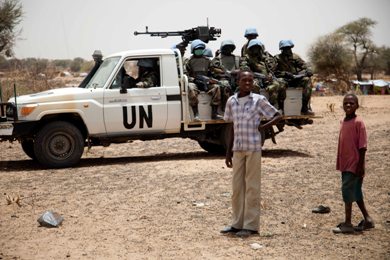Khartoum behind fresh wave of violence over gold in Darfur: report
May 17, 2013 (KHARTOUM) – A new report argues that the Sudanese government’s struggle for control of Darfur’s gold resources, rather than inter-tribal conflicts is behind the recent surge in violence in the war-torn western region.

It found that the Sudanese government is complicit in a violent power play for control of North Darfur’s lucrative gold mines, as part of its heightened economic interest in the region and an ongoing campaign of “state-sponsored atrocity”.
According to the report released earlier this month by the US-based Enough Project, Arab Abbala tribesmen are being armed by Khartoum as part of a bid to wrest control of gold fields in Jebel Amer from the Beni Hussein tribe, who are the traditional custodians of the area.
“While we do not have documented evidence that the government of Sudan ordered the Abbala offensive, it’s clear that the historically state-aligned tribe, with ties to the janjaweed, was not acting without at least tacit government consent”, researchers noted.
VIOLENCE ESCALATES
The escalation of violence since January 2013 has plunged the region into the worst humanitarian crisis in recent years.
The UN estimates that some 150,000 people have been displaced following a spate of attacks by armed Abbala militias, elements of which include the notorious janjaweed forces, which hit the headlines 10 years ago for brutal atrocities allegedly committed at the behest of the Sudanese government.
The report argues that Khartoum has again reprised the role of Abbala militia as a “tool of state repression”, suggesting the government is employing the same “paralleling tactics” it used during the height of the conflict in 2003-04.
“For over a decade, the government of Sudan has pursued a strategy of economic plunder of the periphery through violence and forcible demographic change”, the report said.
A sedentary farming and cattle-rearing Arab community, the Beni Hussein have historically been exempted from attack by state-sponsored militias. However, the recent discovery of gold reserves in their home area, and intense economic pressure on the Sudanese government following South Sudan’s secession and the subsequent loss of oil revenues, has fundamentally altered that dynamic, the report said.
GOLD BOOM
Jebel Amer last year produced a third of Sudan’s gold, despite the absence of major mining operations or foreign direct investment.
Satellite imagery included in the report shows evidence of the presence of commercial mining equipment, as well as the transformation of a relatively desolate area into a thriving mining outpost within a few months.
Darfuri sources interviewed for the report also suggested that North Darfur governor Osman Yosuf Kibir was interested in securing a stake in the mines. However, due to the Beni Hussein’s control of the permit process, Kibir was only able to obtain licences for less than 20 mining sites, even though he owns the pumps needed to operate far more.
Researchers from the Enough Project say that during the height of the latest round of violence, Abbala militia leaders spoke publicly on Sudanese radio, bragging about their position within the state security forces and in many instances used state-supplied vehicles and weapons to conduct attacks.
Reports suggest that Abbala militiamen from across Darfur collected at least 4,000 horses, 2,500 camels, and 130 government-owned vehicles to carry out the attacks.
During a second wave of clashes in late February, hundreds of armed Abbala militiamen attacked al-Sref Beni Hussein, where over 60,000 displaced people had sought refuge in the aftermath of the first wave of attacks.
Internally displaced people interviewed by Amnesty International following the attack, said that armed men arrived on 150 camels and 200 horses, as well as more than 40 four-wheel drive vehicles to attack the town, leaving 53 dead and 66 injured, most of whom were civilians, including women and children.
“A scattered power base in Khartoum means that the Sudanese government no longer speaks with one voice. Instead, middle men and profiteers within the ruling party have gained influence and control. These elements see clear economic benefit from intense periods of violence, particularly in places along Sudan’s marginalised periphery”, the report said, which draws on extensive interviews with sources in Darfur, Khartoum and the diaspora community.
As part of six key recommendations, the Enough Project calls on the US and the international community to provide further support to democratic forces within Sudan and apply pressure to the Sudanese government to grant humanitarian agencies unfettered access to all areas of Darfur.
It also calls on the United States and other partners to exert pressure to ensure that those responsible for human rights abuses during the latest wave of violence are held accountable.
The Enough Project says reconciliation pledges made between the Beni Hussein and Abbala tribes must be honoured and that the international donor community should work to promote Darfur’s economic growth through sustainable and self-sufficient development.
It says companies in the gold supply chain should add Sudan to their list of countries identified as high-risk originating points for gold and that jewellers and gold exchanges “should conduct additional due diligence on gold coming out of Sudan to avoid engaging in the conflict gold trade”.
(ST)
